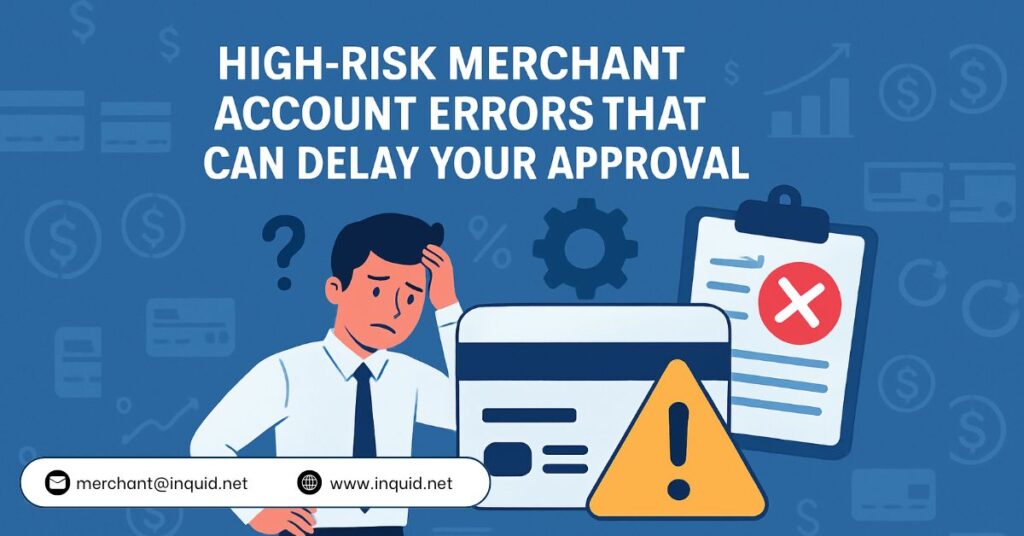
Introduction
Getting approved for a high-risk merchant account isn’t always smooth. Businesses often walk into the process expecting quick results, but end up facing delays or rejections because of small missteps. Whether you’re running an online gaming platform, adult website, or selling supplements, understanding common High-Risk Merchant Account Application Mistakes could be the difference between getting approved quickly or getting stuck in a loop of follow-up requests.
Not Knowing What Counts as High-Risk
Before applying, many businesses don’t realize that their industry even falls into the high-risk category. This leads to applying with the wrong providers or sending incomplete applications. If your business operates in sectors like gambling, adult content, IPTV, supplements, or even ticket sales, you likely need a high-risk merchant account. Going to standard banks or low-risk processors can cause unnecessary delays or outright rejections.
Incomplete or Incorrect Business Documents
This is one of the most common problems. Providers need documents that prove your business is legitimate, compliant, and financially stable. If you’re missing bank statements, identification, processing history, or business licenses, it can immediately stall the process.
Even minor mismatches—like your business name not matching your bank account name—can lead to verification issues. Always double-check that every document is updated, accurate, and clearly labeled before submitting it.
Hiding or Misrepresenting Business Model
Some merchants, either out of fear or lack of knowledge, try to disguise what their business actually does. This backfires fast. High-risk payment providers have experience reviewing all types of models and can spot inconsistencies.
If you operate in a flagged industry, be upfront. Being transparent about what you’re selling and how you’re managing risks shows credibility. It’s far better to work with a provider who already supports your industry than to hide the nature of your services.
If you’re unsure whether your model qualifies, check this UK-specific high-risk merchant guide.
Poor Website Quality or Incomplete Policies
Your website is often the first thing underwriters review. If it’s unprofessional, missing terms and conditions, lacks a privacy policy, or doesn’t clearly state refund or delivery methods, it raises red flags.
The approval team wants to see a business that’s ready to process payments responsibly. Make sure your checkout process works, your contact information is visible, and you’re following regional legal requirements for your product type.
Not Having a Clear Chargeback and Risk Management Strategy
High chargebacks are one of the biggest concerns for providers handling high-risk industries. If your business doesn’t have a clear way of dealing with fraud or refund disputes, that can be a dealbreaker.
Make sure you have tools or policies in place to reduce chargebacks—such as using clear product descriptions, sending automated receipts, and having a responsive customer service channel. Mentioning this upfront in your application or during provider discussions shows you’re proactive.
To understand what providers actually look for, here’s a detailed breakdown on how high-risk account approvals work.
Applying to the Wrong Provider
Not all processors accept high-risk businesses. Applying to low-risk platforms is a waste of time and leads to automatic rejections. What’s worse, it could leave a paper trail that later processors will ask about.
Stick to companies that already specialize in high-risk merchant solutions. They know the documentation needed, understand the risks, and won’t waste your time asking for irrelevant compliance steps.
Rushing the Process
Many businesses apply in a hurry, trying to get processing up as soon as possible—especially after being shut down elsewhere. But this rush can result in submitting half-baked applications with missing details.
Take the time to research your provider, gather the right documents, and understand your risk profile. A clean, well-prepared application often gets faster approval than one submitted in a rush with errors.
Conclusion
Delays in high-risk merchant account approvals are often avoidable. With the right preparation, honest representation, and strong documentation, you can make the process much smoother. If your business fits into a high-risk category, work with specialists who understand the space and guide you through the right steps.
Need help getting started? Talk to the inquid team to find the right high-risk solution for your industry.
